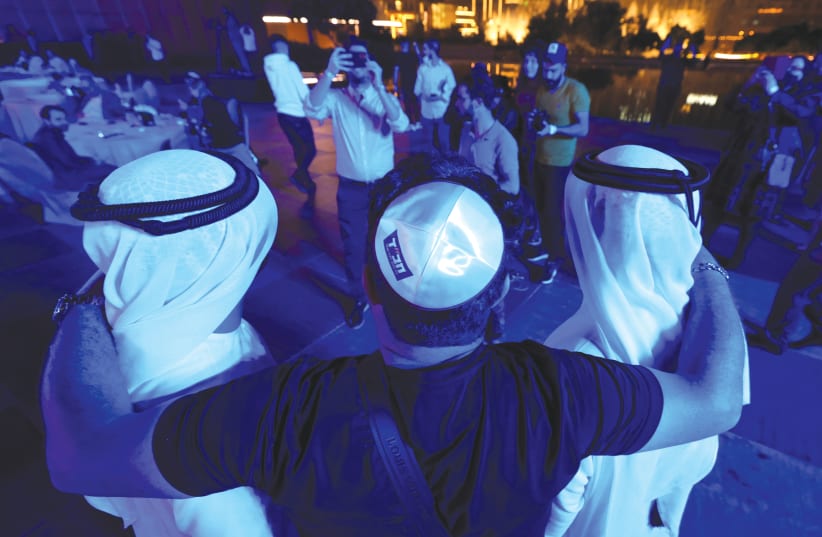Today, that shimmering vision of venerable Jewish communities growing anew and brand-new ones springing dramatically to life in countries across the Arab and Muslim worlds appears to be rapidly morphing into concrete reality. The Alliance of Rabbis in Islamic States (ARIS), created only a few years ago, now boasts rabbinic members residing and serving Jewish communities in such countries as Azerbaijan, Bahrain, Iran, Kazakhstan, Kosovo, Kyrgyzstan Morocco, Nigeria, Turkey, Tunisia, the United Arab Emirates, Uganda and Uzbekistan.
The rapid development of energetic and highly sophisticated Jewish communities in the UAE, where the government has formally licensed synagogues in Abu Dhabi and Dubai, has been widely reported in international and Jewish media. The March 2021 ceremony that celebrated the refurbishment and reopening of the century-old synagogue in Manama, Bahrain was also widely reported.
Also of great significance, though less remarked upon, have been forward steps in Muslim-Jewish relations in countries like Turkey and Morocco, where last December government officials in both nations openly attended Hanukkah menorah-lighting ceremonies. It is of considerable importance that despite difficult relations with Israel and the US in recent years, the Turkish government nevertheless reconstructed five historic synagogues over the past half decade. Turkey has put into effect legislation allowing public and private sector workers to take time off for the Jewish holidays without repercussions. For its part, Morocco, which recently re-established diplomatic relations with Israel, has integrated the history of the Jewish community of the country into the public-school curriculum.
Last month, the Egyptian Ministry of Education approved a new subject in its public schools: “Common Values” in the three Abrahamic religions – Judaism, Christianity and Islam. This decision will give Egyptian students their first-ever opportunity to study verses from the Torah and to learn about Jewish culture. Meanwhile, in Azerbaijan, the Islamic country with the largest Jewish community, the infrastructure of synagogues and Jewish community institutions continues to expand.
The message that is coming through loud and clear in all this activity is that a broad range of Islamic countries are keen to nurture and grow their Jewish communities. Equally heartening is that not only are governments in Muslim-majority countries endeavoring to normalize Jewish life, but that the Jewish communities in those countries are also reaching out in friendship to their Muslim fellow citizens. Rabbis and Jewish community leaders are currently breaking bread at Ramadan iftars around the Islamic world and have begun distributing food packages filled with Ramadan basics like dates, tea, lentils, chickpeas and other staples to their Muslim neighbors, including many people in need.
While it is true that these giant strides in strengthening Jewish life in Muslim countries have come about during a time when Israel has established relations with the UAE, Bahrain, Morocco and Sudan, it is significant that Jewish communities are also flourishing in Turkey and other countries which have not drawn closer to Israel. Indeed, the growing alliance between Muslims and Jews worldwide – including in the Muslim world – is not being driven by Israel-Arab diplomacy. Rather the latter process is being positively impacted by global Jewish-Muslim entente.
In a world where Muslims and Jews are fast becoming trusted partners and friends, the longstanding hostility between Israel and the Islamic and Arabs worlds is rapidly turning into an anachronism – offering hope for reconciliation between Israel and the Palestinians. In the developing global Abrahamic alliance, the Jews of the Islamic world – though relatively modest in numbers – are destined to play an outsized role. After all, the efficacy and durability of the global Muslim-Jewish entente is best showcased by demonstrating that Jews and Muslims can live together in mutual affection and peace and that Jews in Muslim lands are not merely tolerated but very much part of the countries they call home.
Jewish-Muslim friendship and solidarity in the Middle East and elsewhere will allow our faith communities to stand together against antisemitism, Islamophobia and other forms of bigotry and work together on medical, scientific and development projects that will benefit all of humankind. The emergence of vibrant Jewish communities in Muslim lands is an indispensable step in the process of building a global Muslim-Jewish alliance in the years directly ahead.
The writer is a rabbi and is president of the Foundation for Ethnic Understanding and coauthor with Imam Shamsi Ali of Sons of Abraham: A Candid Conversation About the Issues That Divide and Unite Jews and Muslims.
